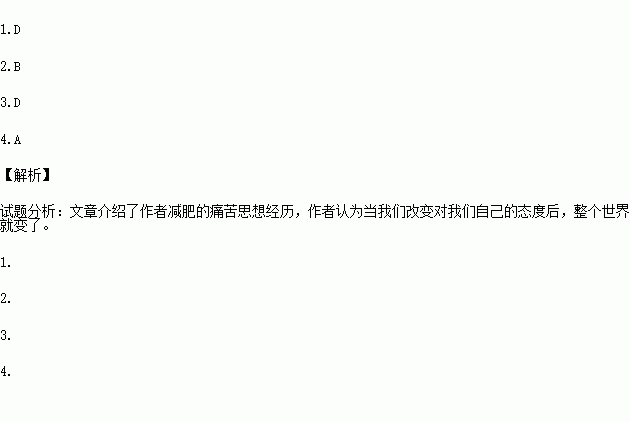题目内容
For many years, I was convinced that my suffering was due to my size. I believed that when the weight disappeared, it would take old wounds, hurts and rejections with it.
Many weight-conscious people also mistakenly believe that changing our bodies will fix everything. Perhaps our mistake is believing that being thin equals being loved, being special, and being cherished. We fantasize (幻想) about what it will be like when we reach the long-awaited goal .We work very hard to realize this dream. Then, at last, we find ourselves there.
But we often gain back what we have lost. Even so, we continue to believe that next time it will be different. Next time, we will keep it off. Next time, being thin will finally fulfill its promise of everlasting happiness, self-worth, and, of course, love.
It took me a long time to realize that there was something more for me to learn about beauty. Beauty standards vary with culture. In Samoa a woman is not considered attractive unless she weighs more than 200 pounds. More importantly, if it’s happiness that we want, why not put our energy there rather than on the size of our body? Why not look inside? Many of us strive hard to change our body, but in vain. We have to find a way to live comfortably inside our body and make friends with and cherish ourselves. When we change our attitudes towards ourselves, the whole world changes.
1.The passage tries to stress the importance of ____________.
A. body size B. different beauty standards
C. culture difference D. attitudes towards life
2.What does the word “everything” in paragraph 2 mean?
A. The whole world B. All the problems.
C. All the properties.D. The absolute truth.
3.What can be inferred about the author?
A. The author is a Samoan.
B. The author succeeded in losing weight.
C. The author probably got wounded in wars or accidents.
D. The author has been troubled by her/his weight.
4.According to the author , what is the common view of those who have lost some weight first and gained it back later ?
A. They feel optimistic about future plans on weight control.
B. They are indifferent to the regained weight.
C. The feel angry about the regained weight.
D. They think they should give up their future plans on weight control.
随着网络的日益发展,网店成为一种新时尚,并且越来越多的学生开始创办网店。假定你是李华,是校报记者,请以“学生是否可以开办网店”为主题给校报撰稿。
支持 | 反对 | 你的观点 |
早一步接触社会 得到实践的机会 | 分心,影响学业; 社会经验少,容易被骗 | ... |
注意:
1.词数100左右;
2.可以适当增加细节,以使行文连贯;
3.标题和开头已经写好,不计入总词数。
Should Students Open Online Stores?
With the Internet developing rapidly, creating an online store becomes trendy. ___________________________________
_________________________________________________________________________________________________________________________________________________________________________________________________________________________________________________________________________________________________________________________________

